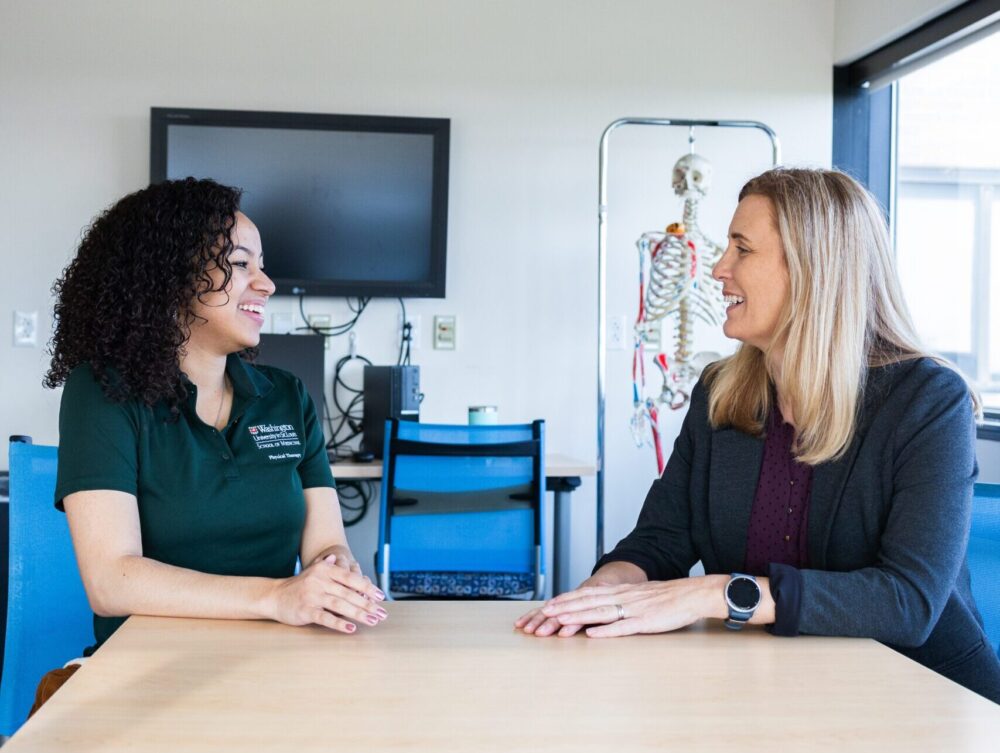Foundation Researcher Spotlight: Marcie Harris-Hayes Shaping Future Treatments One Hip at a Time
Marcie Harris-Hayes, PT, DPT, MSCI, is a professor of physical therapy and orthopedic surgery at Washington University School of Medicine in St. Louis. She is a recipient of the 2016 Orthopedic Research Grant and 2018 Paris Patla Musculoskeletal Grant.
Tell us a little bit about yourself.
I grew up in a small town in southwest Missouri called Collins, population 145. I am the first in my family to go to college and complete a graduate program. My father didn’t go to school and my mom completed her GED, and I relied on sports scholarships to get to go to college.
I attended a small community college called Crowder College in Neosho, Missouri, where I got a basketball scholarship. I also walked on to the softball team, a sport I truly loved. However, it was tough to balance being a female in college sports with the need to work for financial support.
I transferred to Missouri State University and graduated with my bachelor’s degree, then pursued my Master’s in physical therapy at Northwestern University.
What made you want to become a PT?
I was majoring in biology, had a passion for sports, and knew I wanted to help people. A friend introduced me to physical therapy, and it seemed like the perfect way to merge those three things.
Can you talk a little bit about your professional journey?
After graduating from Northwestern, I started at Barnes-Jewish Hospital in St. Louis. I rotated through various specialties and discovered my love for outpatient orthopedics. During this time, my close interaction with faculty at Washington University sparked my interest in research and evidence-based practice. I started doing some lab assisting then a faculty position became available.
As a faculty member, while pursuing my DPT, it became evident that there’s a lack of substantial evidence supporting the treatments we offer. At first, I assisted investigators with their inquiries, which led to me to begin my own research studies. The DPT is a great degree, but it doesn’t teach you research methods and how to do a study which is why I went back to school to get my Master of Science and Clinical Investigation. I received an independent career development award from the Eunice Kennedy Shriver National Institute of Child Health and Human Development, enabling me to transition from my mentor’s research in the low back pain field to focusing on hip-related injuries.
 What kind of research have you been working on in recent years?
What kind of research have you been working on in recent years?
My research team and I have been focused on the effectiveness of rehabilitation for patients who have chronic hip joint pain. The most common problem is femoroacetabular impingement syndrome. Other conditions that fall into this category are labral tears and articular cartilage lesions. We’ve tried to take a systematic approach at assessing some of the different physical therapy approaches. These approaches include, focusing on movement impairments displayed during daily activities and comparing it to standard strength and flexibility approaches. Additionally, we recently investigated the effectiveness of joint mobilization, and the Foundation for Physical Therapy has supported me through that whole timeframe. Specifically, the Foundation has funded me over 5 years with one 2-year Orthopaedic Research Grant and then more recently I received the Paris Patla Muscuoloskeletal Grant for three years of support to investigate joint mobilization.
What is the value of physical therapy research? Who does it benefit and how?
Physical therapy research is extremely valuable. The most effective “drug” available is exercise and it often goes unrecognized for its potential. Demonstrating the effectiveness of rehabilitation benefits the community, preventing major health conditions and potentially reducing the need for unnecessary surgeries. It also assists healthcare providers in offering patient-specific treatments, optimizing outcomes.
Do you have any final thoughts you want to mention?
I want to emphasize the critical importance of the Foundation for Physical Therapy in supporting research within the field. Research funding is becoming increasingly challenging to secure, and the Foundation’s dedication to supporting physical therapy research is crucial. The support provided by the Foundation has been fundamental in advancing studies that otherwise may not have seen the light of day, and for this, I am immensely grateful.

STAY CONNECTED
Use this form to sign up for the Foundation for Physical Therapy Research monthly newsletter.